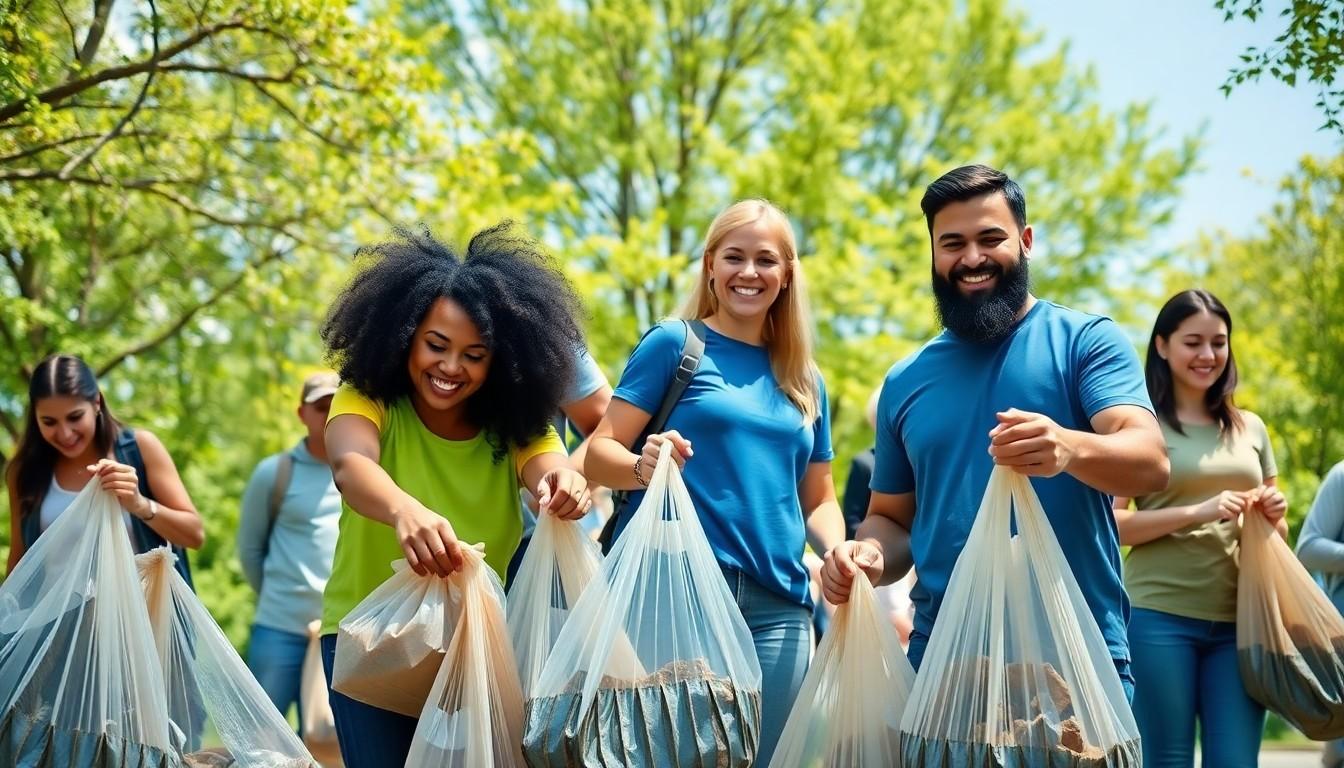In a world where plastic seems to outnumber people, embracing sustainable living isn’t just a trend—it’s a necessity. Picture this: a planet where fresh air, clean oceans, and thriving wildlife aren’t just a fantasy but a daily reality. By making small changes today, anyone can be a hero of their own eco-adventure.
Inspire Sustainable Living
Sustainable living prioritizes practices that reduce environmental impact. It enables individuals to foster a healthier planet through mindful choices.
Definition of Sustainable Living
Sustainable living refers to a lifestyle that aims to minimize one’s ecological footprint. It involves using resources responsibly, ensuring they meet present needs without compromising future generations’ ability to meet theirs. Many individuals embrace sustainable practices like recycling, composting, and using renewable energy sources. By incorporating these habits, they reduce waste and conserve natural resources. Ultimately, sustainable living embodies a commitment to protecting the environment while promoting social equity.
Importance of Sustainability
Sustainability plays a critical role in combating climate change and preserving natural ecosystems. It protects biodiversity, supports clean air, and enhances water quality. Adopting sustainable practices benefits both individuals and communities by improving overall health and well-being. Moreover, sustainable approaches can stimulate economic growth by fostering green jobs and industries. Communities that prioritize sustainability often see enhanced resilience to environmental challenges. Taking steps towards sustainability creates a positive feedback loop, benefiting current and future generations alike.
Key Principles to Inspire Sustainable Living

Sustainable living consists of several key principles that guide individuals towards a greener lifestyle. Each principle plays a significant role in reducing environmental impact and promoting a healthier earth.
Reduce, Reuse, Recycle
Conservation of Resources
Reducing waste starts by making conscious purchasing choices, opting for products with minimal packaging. Reusing items extends their lifespan; think of glass containers repurposed for storage. Recycling materials correctly keeps them out of landfills and allows for new raw materials. Communities benefit from recycling programs, which often provide resources to educate residents on proper practices. Each step contributes to a circular economy, supporting sustainable consumption.
Conserving resources requires awareness of daily habits. Individuals can start by minimizing water usage with shorter showers and efficient appliances. Energy conservation also plays a vital role; using energy-efficient light bulbs cuts electricity bills. Sustainable practices, like buying local produce, reduces the carbon footprint associated with transportation. Each small action amplifies the collective effort, fostering a sustainable future.
Sustainable Transportation

Sustainable transportation methods include biking, walking, or using public transit whenever possible. These alternatives reduce reliance on fossil fuels and lower carbon emissions significantly. Carpooling with others helps decrease the number of vehicles on the road, enhancing air quality. Electric vehicles represent an emerging option, providing a cleaner alternative for commuting. Prioritizing these methods promotes a shift towards greener urban environments.
Practical Tips for Sustainable Living
Adopting sustainable living practices enhances environmental health and personal well-being. Here are actionable strategies to incorporate into daily life.
Eco-Friendly Products
Choosing eco-friendly products supports environmental sustainability and reduces waste. Look for items made from natural or recycled materials. Brands that prioritize sustainability often use minimal packaging, which lessens plastic waste. Opt for reusable items like cloth bags, metal straws, and bamboo utensils instead of single-use plastics. Selecting organic cleaning products further promotes a healthier home environment, benefiting both people and the planet.
Zero Waste Lifestyle
Embracing a zero waste lifestyle significantly reduces landfill contributions. Sorting waste into recyclables, compost, and trash promotes proper disposal and recycling efforts. Reusing jars, containers, and bags decreases reliance on new products. Sourcing second-hand items helps minimize consumption and supports local businesses. Composting food scraps enriches soil and diverts organic waste from landfills, creating a healthier environment.
Sustainable Home Practices
Implementing sustainable home practices cuts energy consumption and fosters a greener living space. Switching to energy-efficient appliances lowers electricity bills and conserves resources. Insulating homes reduces heating and cooling costs, enhancing comfort. Using water-saving fixtures and systems lessens water waste, benefiting local ecosystems. Planting native gardens and using drought-resistant landscaping supports biodiversity while requiring less maintenance and water.
Community Engagement and Education
Community engagement fosters awareness and action toward sustainable living. It empowers individuals to connect with one another and implement eco-friendly practices in their neighborhoods.
Advocacy for Sustainable Practices
Advocacy plays a critical role in promoting sustainable practices. Local organizations and volunteers often lead initiatives that encourage recycling and waste reduction. Community events, such as clean-up days or tree planting, inspire residents to participate actively. These activities build a strong sense of community and highlight the importance of collaboration. Engaging local leaders provides platforms for sharing success stories, motivating others to adopt sustainable habits. Increased visibility of sustainable initiatives leads to heightened participation and commitment among citizens.
Role of Education in Sustainability
Education drives understanding and innovation in sustainability. Schools integrate environmental curricula to teach students about ecological impacts and responsible resource use. Workshops and seminars familiarize community members with sustainable practices, such as composting and energy conservation. Nonprofits often provide resources that empower individuals to make informed choices about their consumption patterns. Educational campaigns raise awareness about climate change and its consequences, instilling a sense of urgency for action. Sharing knowledge expands the reach of sustainability efforts, creating a ripple effect that influences behavior on a larger scale.
Adopting Eco-friendly Habits
Embracing sustainable living isn’t just a trend; it’s a vital step towards a healthier planet. Every individual has the power to make meaningful changes that contribute to a more sustainable future. By adopting eco-friendly habits and engaging with their communities, they can help combat climate change and protect natural ecosystems.
The journey towards sustainability is a collective effort that thrives on awareness and action. As more people commit to these practices, the positive impact on the environment will become increasingly evident. Together, they can create a legacy of sustainability for future generations, ensuring a thriving world for all.

